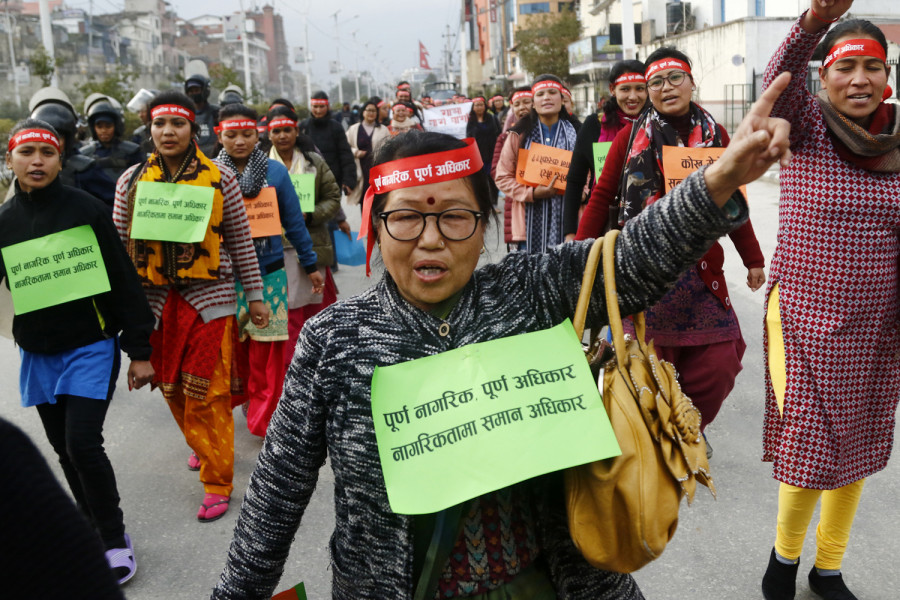Editorial
Women's battle for citizenship continues
The new proposals regarding the Citizenship Amendment Bill still treat women as second-class citizens.
Reforms to nationality legislation have enabled Nepali women to transfer their nationality to their children. But the battle has only been half won. For instance, a child born to a Nepali female citizen from marriage with a foreign citizen in Nepal may be granted naturalised citizenship, but only after producing proof that the child has not acquired the citizenship of his father’s nation. These conditions do not exist for a child born to a Nepali male citizen from marriage with a foreign national.
Last year, the amendment to the Citizenship Act was put on hold citing a lack of consensus among various provisions in the Act that treated men and women differently. But one year on, looks like nothing has changed. Women continue to get the short end of the stick.
According to the existing provision, a woman married to a Nepali man is eligible to get naturalised citizenship once she provides evidence showing that the process for renouncing her foreign citizenship has been initiated. But the same conditions do not apply when a Nepali woman is marrying a foreign national. The ruling party especially have been demanding that a condition be added, which states that the foreign spouse of a Nepali man will only be eligible for citizenship after residing in the country for seven years. But now, as of the last meeting, the Home Ministry proposed 15 years to issue citizenship to a foreign man married to a Nepali woman. Any man wanting to acquire Nepali citizenship should also renounce his citizenship of origin, have good moral character, and must speak one of Nepal’s national languages.
[Read: Citizenship debate has reached another low, rights activists say]
After the promulgation of the constitution in 2015, one of the most contested provisions has been the one on citizenship. Citizenship must provide a greater sense of nationhood to all. The main problem here is that the discussion on citizenship, instead of focusing on the issue of equality has put all its attention on national sovereignty with the debate on the Citizenship Amendment Bill ranging from nationalist rhetoric to outright misogyny. The state has largely been representative of the interests of the stronger sections—the men—and this time too it is no different.
Citizenship should not be about a mere status and formed rights. It should be inclusive, accommodating the interests and needs of all citizens; and as a concept, it should promote participation and agency. But the proposed amendments to the Citizenship Act seems to be doing none. What’s more, there is much hullabaloo from the government regarding the upcoming Constitution Day wherein it wants all its citizens to celebrate with much fanfare. Decrees have been issued to all civil servants to attend Constitution Day celebrations as well mandatorily. While the government is all set to celebrate the constitution, it fails to acknowledge that it is treating half of its population—the women—as second class citizens.
For a society to prosper, its laws must serve and treat its members equally. Stability and prosperity cannot be achieved if a society carries within it the seeds of exclusion where one half of society is protected while the other half’s offended. The state must guarantee equal rights to all its citizens, regardless of gender.
***
What do you think?
Dear reader, we’d like to hear from you. We regularly publish letters to the editor on contemporary issues or direct responses to something the Post has recently published. Please send your letters to [email protected] with "Letter to the Editor" in the subject line. Please include your name, location, and a contact address so one of our editors can reach out to you.




 9.89°C Kathmandu
9.89°C Kathmandu














